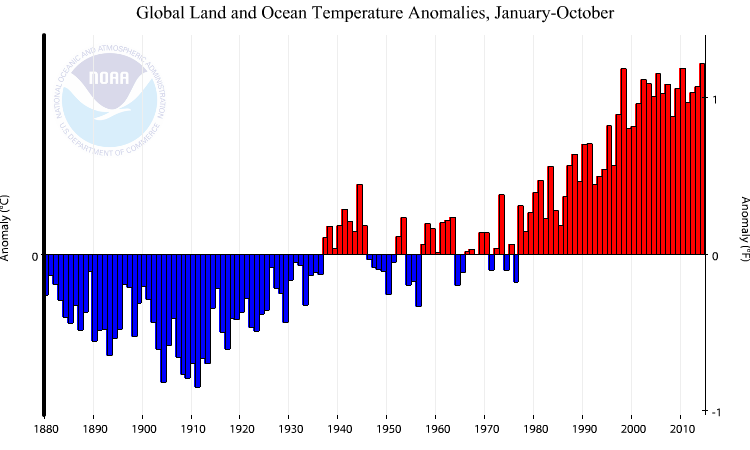|
|
|
|
|
|
 |
 |
 |
 |
 |
 |
 |
 |
 |
 |
 |
 |
 |
 |
|
|
|
|
Climate Change Altering Frequency, Intensity of Hurricanes
Climate change may be the driving force behind fewer, yet more powerful hurricanes and tropical storms, says Dr. Jim Elsner (FSU). More >
|
More Than Majestic, Fjords Are Carbon Sequestration Superstars
The dramatic, glacier-carved inlets capture and store carbon better than other open-water marine systems, removing it from the atmosphere, according to a paper co-authored by Dr. Thomas Bianchi (UF). More >
|
Study Shows Dietary Supplements Are Good For Coral Health
A new study led by UM researchers found that the critically endangered Staghorn coral may benefit from supplemental nutrition to mitigate the adverse impacts of global climate change. More >
|
|

|
|
EPA Grant to Fund Study of Extreme Heat Hazards Extreme heat kills more people in the U.S. than hurricanes, with many victims succumbing to heat inside their own homes. Dr. Chris Uejio (FSU) is leading a 3-year, $500,000 EPA study titled "Indoor Environment and Emergency Response Health Outcomes." The study will investigate what building characteristics increase indoor heat exposure, whether people who live in hotter buildings are more likely to report extreme heat health problems, and how future climate change may increase indoor heat exposures. More >
|
FAQs for Young Scientists
State Climatologist David Zierden (FSU) recently fielded some climate change questions questions submitted to the FCI by an 8th grade student in Florida. We've posted Mr. Zierden's thoughtful responses on our FCI FAQ webpage for the benefit of other budding young scientists, as well as the general public.
|
UM-Based Cooperative Research Institute Receives $125 Million NOAA Award, Renewed Agreement
The Cooperative Institute for Marine and Atmospheric Studies (CIMAS), based at UM, will continue to bring together the research and educational resources of ten partner universities to increase scientific understanding of Earth's oceans and atmosphere. More >
|
|
|
|
|
|
Resilient Redesign II Workshop
On July 20-22, 2015, the Southeast Florida Regional Climate Change Compact ("the Compact") will convene Resilient Redesign II in collaboration with the FCI. Hosted by the Florida Center for Environmental Studies on the FAU Davie Campus, the workshop will provide opportunities for researchers and practitioners to envision South Florida's future. More >
|
Summer Activities at FAU
Summertime promises no slowdown of activity at FAU's Center for Environmental Studies (CES). A popular USGS series of technical meetings continues with two timely and informative events on precipitation downscaling and invasive species. And for those researching or adapting to sea-level rise, CES announces its ongoing service, Sea-Level Rise Expeditions, offered throughout South Florida. More >
|
Data Harmonization Workshop A Success
At an AgMIP/USDA workshop held last month in Maryland and attended by 55 researchers, a shared vision was developed for a "distributed network of linked, compatible agricultural databases into which researchers provide data that are easily shared among users with maximum impact of contributions and harmonized for easy discovery, open access and usability in models and statistical analyses." More >
|
|
Florida Events
Jun 7-20, 2015 | FAMU AG-DISCOVERY Summer Program for Teens | Tallahassee, FLJun 16-17, 2015 | EPA Workshop: Coastal Resilience for the Water Sector: Training for Utilities & Technical Assistance Providers | Boca Raton, FLJun 22-23, 2015 | USGS-FAU Precipitation Downscaling Technical Meeting | Davie, FLJul 12-17, 2015 | FAMU AG-TECH Century 21 Summer Enrichment Program for Teens | Tallahassee, FLJul 20-22, 2015 | Resilient Redesign II Workshop | Davie, FLNov 16-19, 2015 | National Working Waterfronts & Waterways Symposium | Tampa, FL More >
|
Jun 1, 2015 | Webinar: US Climate Change Efforts and Citizen Science w/ Dr. John Holdren (White House) & Dr. Rick Spinrad (NOAA) | Online
Jun 24-26, 2015 | ACCO Climate Strategies Forum | Washington, DC
Sep 9-11, 2015 | Virtual Workshop: Observing & Modeling Climate Variability in the Intra-Americas Seas & Impacts on the Continental Americas & the Caribbean | Online
Oct 11-14, 2015 | 2nd International Conference on Global Food Security | Ithaca, NY
|
|
Publications
FCI authors are in bold. Ellwood, E. R., Dunckel, B. A., Flemons, P., Guralnick, R., Nelson, G., Newman, G., Newman, S., Paul, D., Riccardi, G., Rios, N., Seltmann, K. C., & Mast, A. R. (2015). Accelerating the Digitization of Biodiversity Research Specimens through Online Public Participation. BioScience, 65(4), 383-396. Gornish, E. S., & Miller, T. E. (2015). Plant Community Responses to Simultaneous Changes in Temperature, Nitrogen Availability, and Invasion. PLoS ONE, 10(4), e0123715. Hong, Y., & Liu, G. (2015). The Characteristics of Ice Cloud Properties Derived from CloudSat and CALIPSO Measurements. J. Climate, 28(9), 3880-3901. Kang, N. - Y., & Elsner, J. B. (2015). Trade-off between intensity and frequency of global tropical cyclones. Nature Climate Change, early online release. Seo, E. - K., Hristova-Veleva, S., Liu, G., Ou, M. - L., & Ryu, G. - H. (2015). Long-Term Comparison of Collocated Instantaneous Rain Retrievals from the TRMM Microwave Imager and Precipitation Radar over the Ocean. J. Appl. Meteor. Climatol., 54(4), 867-879. Smith, R. W., Bianchi, T. S., Allison, M., Savage, C., & Galy, V. (2015). High rates of organic carbon burial in fjord sediments globally. Nature Geosci, 8(6), 450-453. Stephens, S. H., DeLorme, D. E., & Hagen, S. C. (2015). Evaluating the Utility and Communicative Effectiveness of an Interactive Sea-Level Rise Viewer Through Stakeholder Engagement. Journal of Business and Technical Communication, 29(3), 314-343. Wyneken, J., & Lolavar, A. (2015). Loggerhead sea turtle environmental sex determination: Implications of moisture and temperature for climate change based predictions for species survival. J. Exp. Zool. (Mol. Dev. Evol.), 324(3), 295-314.
|
About Us
The Florida Climate Institute (FCI) is a multi-disciplinary network of national and international research and public organizations, scientists, and individuals concerned with achieving a better understanding of climate variability and change.
|
|
|
|
 |
 |
 |
 |
 |
 |
 |
 |
 |
 |
 |
 |
 |
 |
|
|
|
|
|